
Australian Greens SA is a green political party located in the Australian state of South Australia. It is a member of the federation of the Australian Greens party.
The term swing refers to the extent of change in voter support, typically from one election or opinion poll to another, expressed as a positive or negative percentage point. For the Australian House of Representatives and the lower houses of the parliaments of all the states and territories except Tasmania and the ACT, Australia employs preferential voting in single-member constituencies. Under the full-preference instant-runoff voting system, in each seat the candidate with the lowest vote is eliminated and their preferences are distributed, which is repeated until only two candidates remain. While every seat has a two-candidate preferred (TCP) result, seats where the major parties have come first and second are commonly referred to as having a two-party-preferred (TPP) result. The concept of "swing" in Australian elections is not simply a function of the difference between the votes of the two leading candidates, as it is in Britain. To know the majority of any seat, and therefore the swing necessary for it to change hands, it is necessary to know the preferences of all the voters, regardless of their first preference votes. It is not uncommon in Australia for candidates who have comfortable leads on the first count to fail to win the seat, because "preference flows" go against them.
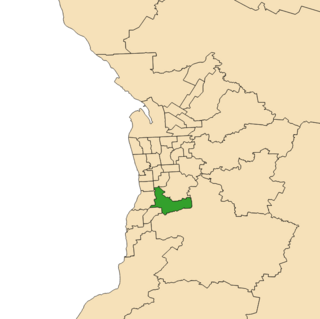
Davenport is a single-member electoral district for the South Australian House of Assembly. It is named after nineteenth-century pioneer and politician Sir Samuel Davenport. Davenport is a 57.7 km² electorate covering part of outer suburban Adelaide and the southern foothills of the Adelaide Hills. It takes in the suburbs of Aberfoyle Park, Bedford Park, Bellevue Heights, Chandlers Hill, Cherry Gardens, and Flagstaff Hill; and part of Happy Valley.
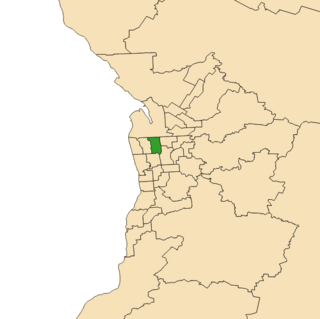
Croydon is a single-member electoral district for the South Australian House of Assembly. Named after the suburb of Croydon, it is a 18.78 km2 (7.25 sq mi) suburban electorate in Adelaide's inner north-west. In addition to Croydon, it includes Angle Park, Athol Park, Bowden, Brompton, Croydon Park, Devon Park, Dudley Park, Ferryden Park, Kilkenny, Mansfield Park, Regency Park, Renown Park, Ridleyton, West Croydon, Woodville Gardens; and parts of Allenby Gardens, Welland, and West Hindmarsh.

Wright is a single-member electoral district for the South Australian House of Assembly. Named after the 19th century South Australian architect Edmund Wright, it is a 21 km2 (8.1 sq mi) suburban electorate in Adelaide's outer north-east, taking in the suburbs of Brahma Lodge, Gulfview Heights, Modbury Heights, Redwood Park, Salisbury South and Wynn Vale, as well as parts of Salisbury East and Surrey Downs.
Iain Frederick Evans is a former Australian politician. He was leader of the South Australian Division of the Liberal Party of Australia from 2006 to 2007.
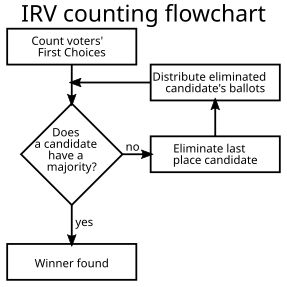
In Australian politics, the two-party-preferred vote is the result of an election or opinion poll after preferences have been distributed to the highest two candidates, who in some cases can be independents. For the purposes of TPP, the Liberal/National Coalition is usually considered a single party, with Labor being the other major party. Typically the TPP is expressed as the percentages of votes attracted by each of the two major parties, e.g. "Coalition 50%, Labor 50%", where the values include both primary votes and preferences. The TPP is an indicator of how much swing has been attained/is required to change the result, taking into consideration preferences, which may have a significant effect on the result.
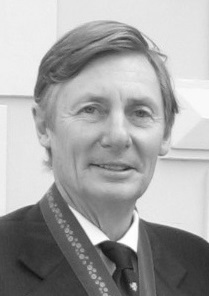
State elections were held in South Australia on 7 December 1985. All 47 seats in the South Australian House of Assembly were up for election. The incumbent Australian Labor Party led by Premier of South Australia John Bannon increased its majority, and defeated the Liberal Party of Australia led by Leader of the Opposition John Olsen.

State elections were held in South Australia on 6 November 1982. All 47 seats in the South Australian House of Assembly were up for election. The incumbent Liberal Party of Australia led by Premier of South Australia David Tonkin was defeated by the Australian Labor Party led by Leader of the Opposition John Bannon.
State elections were held in South Australia on 15 September 1979. All 47 seats in the South Australian House of Assembly were up for election. The incumbent Australian Labor Party led by Premier of South Australia Des Corcoran was defeated by the Liberal Party of Australia led by Leader of the Opposition David Tonkin.

Gamers 4 Croydon (G4C) was a minor political party in South Australia which contested the 2010 state election. The party disbanded shortly after the election and endorsed the Australian Sex Party and the Greens as possible replacements for support.

The 2014 South Australian state election elected members to the 53rd Parliament of South Australia on 15 March 2014, to fill all 47 seats in the House of Assembly and 11 of 22 seats in the Legislative Council. The 12-year-incumbent Australian Labor Party (SA) government, led by Premier Jay Weatherill, won its fourth consecutive four-year term in government, a record 16 years of Labor government, defeating the opposition Liberal Party of Australia (SA), led by Opposition Leader Steven Marshall.
Save the RAH was a minor political party in South Australia, a single-issue party with the aim of stopping the relocation of Adelaide's main hospital, the Royal Adelaide Hospital (RAH). It ran candidates in 11 of the 47 seats in the House of Assembly at the 2010 state election. The party received 5,381 votes, or 0.55 percent of the statewide vote. In the Legislative Council, the party received 9,236 votes, or 0.97 percent. This was the highest upper house primary vote received by a party without winning a seat. The party is no longer registered.
The Fair Land Tax – Tax Party is a registered minor political party in South Australia led by Andrew Desyllas. Its platform consists of more favourable land tax rates. It ran at the 2010 state election with negligible results. The party contested the 2014 state election again with negligible results.
The Multicultural Progress Party is a defunct minor political party in South Australia led by Lam Duc Vu and Trish Nguyen from IFIG Australia (Melbourne). The party contested the 2014 state election in the upper house with a 0.2 percent vote.

The 2018 South Australian state election to elect members to the 54th Parliament of South Australia was held on 17 March 2018. All 47 seats in the House of Assembly or lower house, whose members were elected at the 2014 election, and 11 of 22 seats in the Legislative Council or upper house, last filled at the 2010 election, were contested. The record-16-year-incumbent Australian Labor Party (SA) government led by Premier Jay Weatherill was seeking a fifth four-year term, but was defeated by the opposition Liberal Party of Australia (SA), led by Opposition Leader Steven Marshall. Nick Xenophon's new SA Best party unsuccessfully sought to obtain the balance of power.

A by-election for the seat of Fisher in the South Australian House of Assembly was held on 6 December 2014. The by-election was triggered by the death of independent MP Bob Such on 11 October 2014. Originally elected to Fisher for the Liberal Party of Australia at the 1989 election, defeating the one-term Australian Labor Party MP Philip Tyler, Such left the party in 2000.
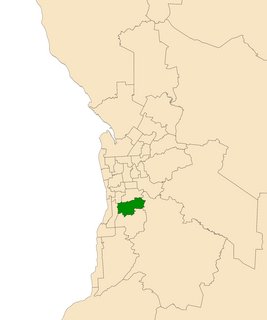
A by-election for the seat of Davenport in the South Australian House of Assembly was held on 31 January 2015. The by-election was triggered by the resignation of Liberal Party of Australia MP and former Liberal leader Iain Evans, who retained the seat at the 2014 election on a 58.1 (−2.8) percent two-party-preferred vote. Liberal Sam Duluk went on to win the seat despite a five-point two-party swing, turning the historically safe seat of Davenport in to a marginal for the first time.
This is a list of members of the South Australian House of Assembly from 1896 to 1899, as elected at the 1896 colonial election:
The Child Protection Party is a registered minor political party in Australia and South Australia led by Tony Tonkin. Its platform is based around child protection.













